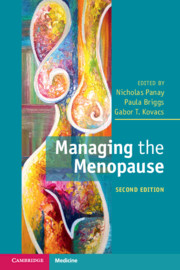Book contents
- Managing the Menopause
- Managing the Menopause
- Copyright page
- Contents
- Contributors
- Foreword
- Chapter 1 Physiology of the Menstrual Cycle and Changes in the Perimenopause
- Chapter 2 Clinical Features of the Menopause/Postmenopause
- Chapter 3 The Ovarian Reserve
- Chapter 4 Premature Ovarian Insufficiency
- Chapter 5 Premature Ovarian Insufficiency
- Chapter 6 Natural Hormone Replacement Therapy after Menopause by Ovarian Tissue Transplantation
- Chapter 7 Migraine in the Menopause
- Chapter 8 Psychological Aspects of the Menopause
- Chapter 9 Memory and Mood in the Menopause
- Chapter 10 Libido and Sexual Function in the Menopause
- Chapter 11 Vulvo-Vaginal Atrophy (VVA)
- Chapter 12 Pelvic Floor, Urinary Problems and the Menopause
- Chapter 13 The Effect of Menopause on the Musculoskeletal System
- Chapter 14 Hormonal Management of Osteoporosis during the Menopause
- Chapter 15 Cardiovascular Disease and the Menopause
- Chapter 16 Gynecological Pathology in the Menopause (Excluding Cancers)
- Chapter 17 Nutrition and Weight Gain in the Menopause
- Chapter 18 The Use of Estrogens and Progestogens in Menopausal Hormone Therapy
- Chapter 19 Androgen Therapy for Postmenopausal Women
- Cahpter 20 Contraception for the Perimenopausal Woman
- Chapter 21 Hormone Therapy and Cancer
- Chapter 22 Menopausal Hormone Therapy (MHT) and Venous Thrombosis
- Chapter 23 The Risk–Benefit Analysis of Menopausal Hormone Therapy in the Menopause
- Chapter 24 Selective Estrogen Receptor Modulators (SERMs) and Menopausal Hormone Therapy (MHT)
- Chapter 25 Non-hormonal Treatments for Menopausal Symptoms
- Chapter 26 Alternative Therapies for the Management of Menopausal Symptoms
- Chapter 27 Menopause in Primary Care
- Index
- References
Chapter 9 - Memory and Mood in the Menopause
Published online by Cambridge University Press: 18 June 2020
- Managing the Menopause
- Managing the Menopause
- Copyright page
- Contents
- Contributors
- Foreword
- Chapter 1 Physiology of the Menstrual Cycle and Changes in the Perimenopause
- Chapter 2 Clinical Features of the Menopause/Postmenopause
- Chapter 3 The Ovarian Reserve
- Chapter 4 Premature Ovarian Insufficiency
- Chapter 5 Premature Ovarian Insufficiency
- Chapter 6 Natural Hormone Replacement Therapy after Menopause by Ovarian Tissue Transplantation
- Chapter 7 Migraine in the Menopause
- Chapter 8 Psychological Aspects of the Menopause
- Chapter 9 Memory and Mood in the Menopause
- Chapter 10 Libido and Sexual Function in the Menopause
- Chapter 11 Vulvo-Vaginal Atrophy (VVA)
- Chapter 12 Pelvic Floor, Urinary Problems and the Menopause
- Chapter 13 The Effect of Menopause on the Musculoskeletal System
- Chapter 14 Hormonal Management of Osteoporosis during the Menopause
- Chapter 15 Cardiovascular Disease and the Menopause
- Chapter 16 Gynecological Pathology in the Menopause (Excluding Cancers)
- Chapter 17 Nutrition and Weight Gain in the Menopause
- Chapter 18 The Use of Estrogens and Progestogens in Menopausal Hormone Therapy
- Chapter 19 Androgen Therapy for Postmenopausal Women
- Cahpter 20 Contraception for the Perimenopausal Woman
- Chapter 21 Hormone Therapy and Cancer
- Chapter 22 Menopausal Hormone Therapy (MHT) and Venous Thrombosis
- Chapter 23 The Risk–Benefit Analysis of Menopausal Hormone Therapy in the Menopause
- Chapter 24 Selective Estrogen Receptor Modulators (SERMs) and Menopausal Hormone Therapy (MHT)
- Chapter 25 Non-hormonal Treatments for Menopausal Symptoms
- Chapter 26 Alternative Therapies for the Management of Menopausal Symptoms
- Chapter 27 Menopause in Primary Care
- Index
- References
Summary
Previous studies have reported that the menopause is associated with deterioration in memory and mood in some women. Also, a significant body of research suggests that hormone ‘replacement’ therapy (HRT) – now referred to as menopausal hormone therapy (MHT) – specifically with estrogen, may act as a prophylaxis against the risk for developing Alzheimer’s disease (AD) and a treatment for perimenopausal depression. The precise nature, and biological basis, of this relationship is still not fully understood. However, it probably involves a complex interaction between genes, the environment and the mode and timing of MHT prescription. Increasing our understanding of the interplay between these factors during the menopause may permit us to target more specific treatments to vulnerable individuals. Furthermore, it offers a window of opportunity to understand the putative role of estrogen in psychiatric disorders at other times of the reproductive cycle. The current chapter will focus on the role of estrogen on Alzheimer’s disease and depression during the menopause.
- Type
- Chapter
- Information
- Managing the Menopause , pp. 86 - 97Publisher: Cambridge University PressPrint publication year: 2020

